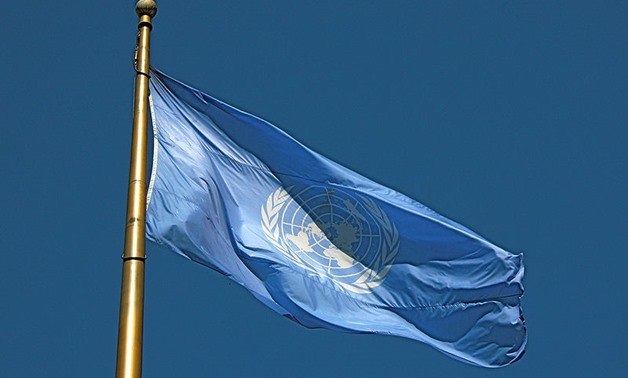
The flag of the United Nations, flying at United Nations Plaza in the Civic Center, San Francisco, California, United States of America – Makaristos/Wikimedia
CAIRO – 17 January 2018: Shortly before actually cutting the U.S. aid to the United Nations Palestinian relief agency UNRWA, Trump threatened to withhold future aid payments to the agency over what he called the Palestinians' unwillingness to talk peace with Israel.
In a Twitter post on January 2 Trump said that Washington gives the Palestinians "Hundreds of millions of dollars a year and get no appreciation or respect.”
A senior Israeli official, speaking on condition of anonymity said, "Prime Minister [Benjamin Netanyah] supports a gradual cut to UNRWA."
The UNRWA called on the leaders to differentiate between politics and humanitarian issues. However, the United States decided on Tuesday, that it will give the UNRWA $60 million in aid for Palestinians and will withhold a further $65 million "for future consideration," according to a U.S. official.
The UN Relief and Works Agency for Palestinian Refugees (UNRWA) serves millions of Palestinian refugees and displaced persons (IDPs) in Jordan, Palestine, Lebanon and Syria. It is almost entirely funded by voluntary contributions from UN member states.
The UNRWA protects, according to the agency’s official website, the rights of some five million Palestinian refugees and IDPs according to international law. Since 1948, the agency has worked to aid the refugees who live in areas of conflict, especially in cases of emergency, and support their right to have education, medical care, good shelter and dignified life.
.jpg)
FILE - UK Minister of State for International Development, Alan Duncan MP (fourth from left in picture), visits Gaza, 10th December 2012 - UNRWA/Shareef Sarhan
In Gaza and West Bank, the UNRWA has handled about 350 schools and educational facilities, educating more than 29,000 students, according to the agency’s official website.
Although more than 90 percent of water in Gaza became undrinkable, UNRWA has worked through 22 medical service centers that serve more than 1.25 million refugees. The UNRWA has also served about 13,000 refugee patients in the West Bank per month.
Since 2010, the UNRWA has constructed over 34 schools and three medical centers in Gaza. Saudi Arabia funded the UNRWA’s project to construct 752 housing units in Rafah. In addition, Japan, the Netherlands and the United Arab Emirates funded building 650 other units in Khan Younis.
In Jordan, More than 115,000 students were provided basic education in 172 UNRWA schools, according to the agency’s website.
The UNRWA has served about 56 percent of the Palestinian IDPs registered in Jordan. UNRWA’s 24 health facilities have provided general medical consultations to more than 1.9 million persons annually.
Lebanon is the only place where the UNRWA has served secondary education students. It has educated over 31,000 students in 69 schools, according to the agency’s website. More than 65,000 Palestinian refugee children have received primary and preparatory education in the UNRWA’s 118 double shift schools.
About 50 percent of the IDPs in Lebanon stay in tents. Only in Lebanon, UNRWA has coordinated with the Palestinian Red Crescent to deliver secondary health care. About 931,000 persons are provided general medical consultations annually.
As many as 500,000 Palestinian refugees who live in Syria are not able to access Syrian hospitals, due to the ongoing multi-sided armed conflict in Syria that started in 2011. The UNRWA is reportedly the only source of medical care.
Supporting Palestinian refugees who work as fishermen, dressmakers or in other small-scale industries, the UNRWA helped out with about 400,000 personal loans, according to the agency’s website.
In a unilateral decision, on December 6, U.S. President Donald Trump recognized Jerusalem as Israel’s capital and announced the relocation of the American Embassy from Tel Aviv to Jerusalem.
This decision was condemned and rejected by all Arab and Islamic countries, as well as most western and Asian countries.

.jpg)
Comments
Leave a Comment